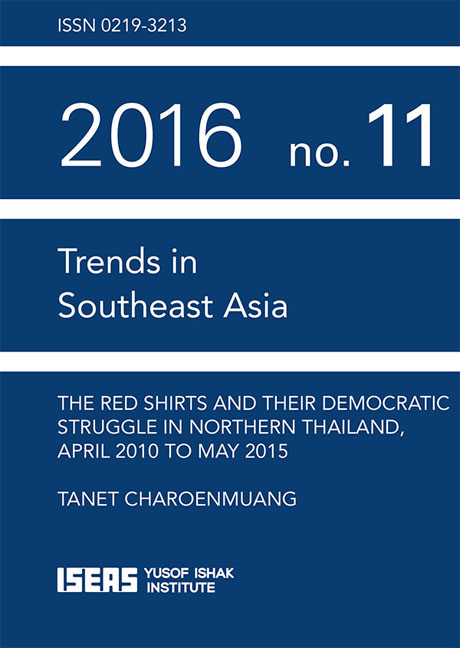The Red Shirts and Their Democratic Struggle in Northern Thailand, April 2010 to May 2015
Published online by Cambridge University Press: 09 March 2019
Summary
The deaths of people (at Ratchadumnern Avenue and Ratchaprasong Intersection) during April and May 2010 brought about “Eye-opening” (Enlightenment) among villagers. They have now understood how the state is ready to use violence and suppress its people…that the state sees a people's demonstration not just as a call for democracy, but war. The state sees people as its enemy and intends to destroy them. The killings in Bangkok have transformed those villagers to be fighters who are ready to die for democracy.
Pinkaew Luang-aramsri, 2013
INTRODUCTION
Throughout the year 2013 and in the early stages of the following year, Thailand was filled with political excitement generated by Red Shirt demonstrations both in Bangkok and outside, in support of the elected Yingluck Government. This led many to believe that the Red Shirt movement was a strong democratic force, particularly in the northeast and northern regions. It appeared ready to oppose the return of an authoritarian regime at all costs, and if a military coup were to be staged, the Red Shirts seemed prepared to establish a government in exile, or even carve out a Federation of Isan-Lanna States from Thailand's existing territory.
Andrew Walker's 2012 study of peasants in rural Chiang Mai presented a vivid picture of the extent to which villager-farmers and rural politics have been transformed since Thaksin's Pheu Thai Party came to power in 2001 and created a strong impact there after the coup in 2006. There are two frequently-quoted studies on the Red Shirts in Northeast and Northern Thailand. The first was written in November 2013 and published in 2014, and the second was published in September 2014. Both confirm the findings in Walker's study, describing strong political activism among Red Shirt villagers in these two regions. They tell a developing story of villagers growing into politically-active and brave fighters, ready to protect and sacrifice their lives for the sake of democracy. The second work is particularly important because its field research was conducted on Red Shirts in the conflict zones of the four districts of Chiang Mai Province. These are the districts of Mueang, Sankampaeng, Doisaket, and Fang-Mae Ai (considered the capital of the Red Shirts in the North).
- Type
- Chapter
- Information
- The Red Shirts and Their Democratic Struggle in Northern Thailand, April 2010 to May 2015 , pp. 1 - 27Publisher: ISEAS–Yusof Ishak InstitutePrint publication year: 2016



